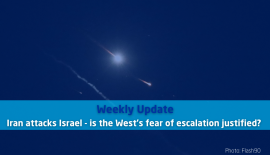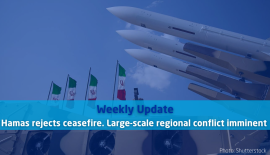Is China becoming the new superpower in the Middle East?
Last week, Iran and Saudi Arabia announced a joint agreement, brokered by China, to pursue the restoration of diplomatic relations. The agreement outlines a two-month process to reopen embassies in Tehran and Riyadh, as well as discussions on progress toward a range of cooperation mechanisms.
This is a major development, given years of hostility between these countries that threatened stability and security in the Gulf and helped fuel conflicts in the Middle East from Yemen to Syria.
The agreement also has potentially huge consequences for Israel, which regards Iran as its arch enemy, while it has been trying to build a positive relationship with the Saudis, building on the 2020 Abraham Accords.
Saudi Arabia cut ties with Iran in 2016 after its embassy in Tehran was stormed during a dispute between the two countries over Riyadh’s execution of a Shi’ite Muslim cleric. The kingdom also has blamed Iran for missile and drone attacks on its oil facilities in 2019 as well as attacks on tankers in Gulf waters. Iran denied the charges. Yemen’s Iran-aligned Houthi movement has also carried out cross-border missile and drone attacks into Saudi Arabia, which leads a coalition fighting the Houthis, and in 2022 extended the strikes to the United Arab Emirates.
The breakthrough agreement highlights China’s global ambition to replace the US as the superpower in a new world order. As part of this strategy it seeks to play the role of mediator in the Middle East and shore up its investments and interests in the Persian Gulf. China is gradually, intentionally, filling a vacuum left by the US withdrawal from the region over the past years. But it is questionable whether China can continue to balance the pursuit of its interests with both sides without derailing its own long-term strategic interests. While China has much to gain in the short term through cooperation with the Gulf states, it sees Iran as a long-term strategic source for energy, security, economic, and investment cooperation.
The Iran-Saudi deal comes at a time that Israel is trying to tie down a normalization agreement with the Saudis. However, previous normalization agreements have depended on US involvement. In recent years, Saudi-US relations have soured, as the Biden Administration has not prioritized a strong relationship with Riyadh.
Hours before announcing its agreement with Iran, Saudi Arabia revealed its terms for normalization with Israel. The Saudi proposal asks for security guarantees from the United States, assistance in developing a civilian nuclear program, and fewer restrictions on U.S. arms sales to Riyadh.
“With its offer to the United States, Riyadh appears to be leaving the door open for a stronger U.S.-Saudi relationship but is making clear by pursuing a hedge with China that they will not be waiting around,” according to the Foundation for Defense of Democracies.
According to Prof. Eyal Zisser, vice rector of Tel Aviv University and chair in Contemporary History of the Middle East, the Saudi decision was actually about Riyadh’s perception of Washington, not Jerusalem.
“I believe that Israel was not a factor in the Saudi decision. Saudi Arabia in any case is not counting on Israel to protect it. It had hoped that the United States would protect it, but the Americans turned out to be hesitant, following the 2019 unmanned aerial vehicle attacks on Saudi Arabia, the UAVs launched against oil tankers and oil facilities,” said Zisser.
While Saudi Arabia, a leader of the Sunni Arab bloc, remains adversarial to Shi’ite Iran and does not trust it, nor does it seek war with the Islamic Republic, said Zisser.
According to analyst Yochanan Visser, “the Iran-Saudi Arabia deal has little to do with Israel, but much to do with the struggle for global hegemony between China and the US.”
According to Visser, the latest agreement does not mean that Saudi Arabia will stop the process of normalization of relations with Israel. The Kingdom is currently undergoing an unprecedented modernization process and needs Israel for technological reasons. The Israeli deterrent against Iran is, furthermore, also important for Saudi Arabia, which always worked to curb Iranian influence in the Middle East.
The Editorial Team – Israel & Christians Today
ANALYSIS: Israel and the Rapprochement Between Iran and Saudi Arabia
Yochanan Visser at Israel Today: “The Iran-Saudi Arabia deal has little to do with Israel, but much to do with the struggle for global hegemony between China and the US”.
Read more..
China’s Iran-Saudi Deal May Not Stick
Jesse Marks at Foreign Policy: “Beijing will have a tough time balancing ties with Riyadh and Tehran.”
Read more..
‘Israel not a factor in Saudi decision’ to renew ties with Iran
Yaakov Lappin at JNS: “Riyadh’s distrust of Washington was a key calculation in the maneuver, according to Tel Aviv University professor Eyal Zisser”.
Read more..
China Inaugurating a New World Order?
Judith Bergman at Gatestone Institute: “The harmful effects of the China-brokered agreement, however, amount to much more than a mere “Saudi slap” to the Biden Administration — especially after the US surrender to a terrorist group, the Taliban, in 2021; the disastrous retreat from the Bagram Air Base; and the Chinese spy balloon hovering for a full week over the most strategic US military sites. They add up to an even more diminished international standing for the US. China can now boast that it is able to rearrange the pieces on the global chessboard, upend alliances that have dominated the international world order for decades, and make peace between enemies. If China can do all that, what else can it do?”
Read more..
The Turn Around |The Book of RUTH with Johannes Gerloff #10
“To turn,” “to turn around” is the key word of the first chapter in the Book of Ruth. It means to consciously turn away from something, to turn around, in order to take a new direction and make a fresh start
SCRIPTURE FOR THE WEEK
Psalm 2:1-8, 10-12
“LORD, how many are my foes!
“Why do the nations conspire and the peoples plot in vain? The kings of the earth rise up and the rulers band together against the LORD and against His anointed, saying, “Let us break their chains and throw off their shackles.” The One enthroned in heaven laughs; the LORD scoffs at them. He rebukes them in His anger and terrifies them in His wrath, saying, “I have installed My King on Zion, My holy mountain.” I will proclaim the LORD’s decree: He said to me, “You are My son; today I have become your father. Ask me, and I will make the nations Your inheritance, the ends of the earth Your possession. Therefore, you kings, be wise; be warned, you rulers of the earth. Serve the LORD with fear and celebrate His rule with trembling. Kiss His son, or He will be angry and your way will lead to your destruction, for His wrath can flare up in a moment. Blessed are all who take refuge in Him.”





